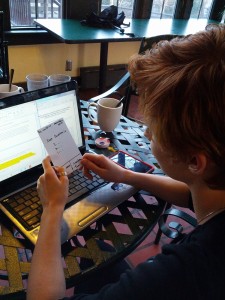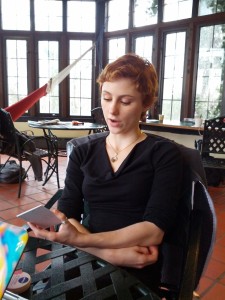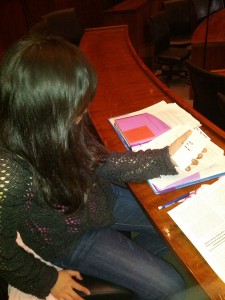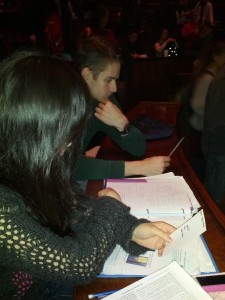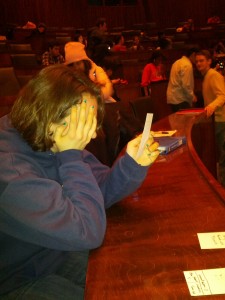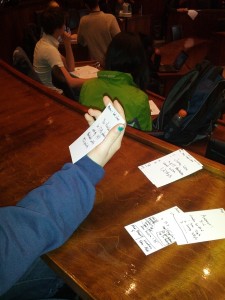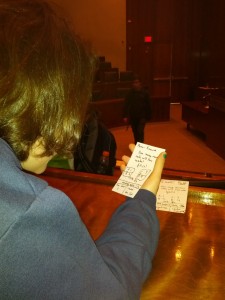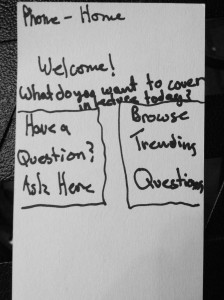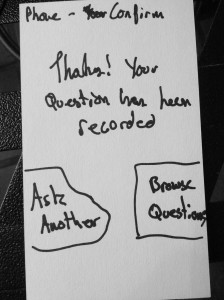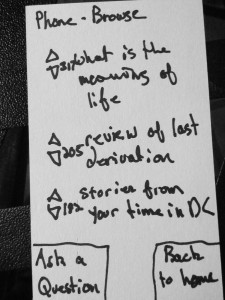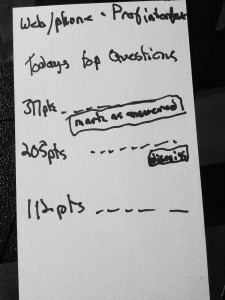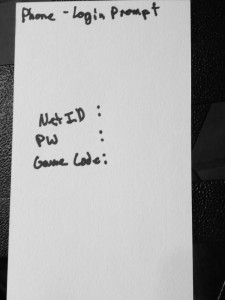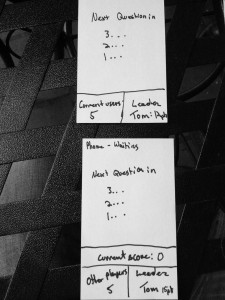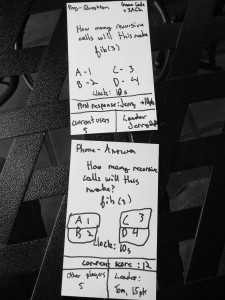OBSERVATIONS
I conducted two sets of observations. The first was a preliminary test, to see how the prototypes would work and practice my observation/testing techniques. The test was conducted at Terrace in the evening with Olivia, a senior EEB major. I believed a senior would be most likely to understand the potential value of the system, after many years of classes. EEB was a good major to test with, as there’s a range of question types, from memorization based to conceptual and mathematical. Finally, I chose Terrace because it provided a more casual environment, allowing us to take the time we needed (especially for me to practice my technique) without any rush.
Here are the observations I made, along with direct quotes from Olivia:
DIRECT QUOTES
- “I thought the interface was intuitive”
- “Why does it have to be on a phone instead of a computer? why not make it either or, like you can access blackboard either on a computer or a phone?”
- “Maybe you could link it with blackboard and have it send you an email update of how many points you have (3-4x/semester)”
- “Make rewards more frequent — maybe once before midterm, once before final”
- Can you have an interface where you can participate in it, but you won’t be scored for class. Can you save the questions for later, to help you study?
- “I like the projector idea, more engaging”
- “What about kids who don’t bring laptops or phones to class?”
- “Strive to answer a certain number of questions, then base reward on percent correct with minimum number to answer in the first place. This would equalize it if people can’t make every class”
- “Offer students a chance to opt-in/opt-out at beginning a year. Some people might not be able to show up on time (class right before is far away). “
- “I like that it’s not extra credit for the class — more fair. $10 to Starbucks is good — everyone likes Starbucks”
- “I like phone/laptop interface — a dedicated device would get stolen too fast”
OBSERVATIONS:
- Immediately knew how to interact with phone/touch based interface. Big, easy to read buttons were good
- Could accurately guess what each button would do on the screen. Having only few buttons made things simple
- Tried to hold the “projector” cards as if they were a phone — next time, make it more clear that projector cards are up on the screen
- Seemed to appreciate the idea, and recognize the potential for making better use of the time between classes
The second set of observations was with a group of Freshman before a NEU 259 lecture (11 am) in Robertson Auditorium. I tried to find a group with a wide variety of intended majors, including EEB, COS, and ENG, to see how the system would be perceived by people with different academic interests. I was glad to also be able to find another EEB major, to be able to compare their responses with Olivia’s. I met with Katie, Allister, and Amanda. The practice observation session paid off, as I was able to move through the real observation quickly, making the best use of the limited amount of time between classes. Again, I recorded direct quotes as well as my own observations
DIRECT QUOTES
- “I liked the idea of it being a question that I might be able to get a better question to in lecture”
- “Only having 15 seconds might make me more stressed than it would be helpful”
- “I’m ambivalent about being compared to other people in the class — that could make me feel really stupid, or that other people are really smart, or that I’m ahead of other people because they haven’t been playing — I just don’t know”
- “I don’t like it as a mandatory thing that I have to do”
- “I suppose it’s alright that it’s competitive, because it might be a good metric of how I’m doing in the class”
- “Definitely have score anonymous”
- “What about extra credit — but some people can’t be here early, so maybe not?”
- “Ten seconds is too little time”
OBSERVATIONS
- Was visibly stressed when she couldn’t figure out the question in 10 seconds (even though the clock wasn’t actually counting down)
- Younger students were more focused on their score being anonymous and whether they might get class credit. Older student (Olivia) was more focused on sharing feedback with professor, to get more out of lecture
- Seemed to be still rooted in high school class mentality — asked why didn’t we just ask the professor, instead of designing a big interface for it.
- Enjoyed the competitive nature of it — had “mock” competition of how quickly they could respond. Perhaps it could be good to play up the fun/competitive side of it?
BRAINSTORMING — worked with Clay Whetung, Andrew Callahan, Mario Alvarez
- Soothing and/or energetic patterns to get you in the mood for lecture
- Collaborative game for all to play
- Survey about what you want to see in the lecture
- Slideshow of interesting topics in news or inspirational videos related to the topic of the class (presumably curated by the professor).
- Guided meditation to relax people before class
- Organized back massages. Odd rows give massages to even rows, then the reverse.
- Summary of previous content in lecture
- Physical art supplies, and the class together creates a communal piece of art
- Digital doodle-board — let people draw together
- Digital collaborative music – something like .http://www.earslap.com/projectslab/otomata
- Parallelizable puzzles/challenges/problems for people to solve together. Multiple choice or free-form, and people in class vote for answer. Precepts compete against each other
- Anonymously ask questions for the lecturer to answer, Piazza-style. Vote on questions you especially want answered
- Aggregate websites that people are looking at (voluntarily, of course). Like this, you can see what everyone’s looking at and potentially provoke discussion
- 10 minute lesson series (potentially related to course material, or not at all). Could be student taught or prof taught. Consider 10 minute html, 10 minute css, 10 minute knitting, etc
- Performance of lecture relevant material — consider a music course, where many students are in the orchestra. One (or more) of the students could play a piece before class that would then be discussed in lecture
- Interactive quiz show on lecture material beforehand. Correct answers win extra fun
- Correct answers win starbucks gift card
- Correct answers load kidbleach.com (cute pictures)
TOP TWO IDEAS
- Interactive quiz show on lecture material beforehand. Correct answers win extra fun
- Potentially win Starbucks gift card — good to solve sleep problem
- Potentially load kidbleach.com (cute animals) — who doesn’t love cats
- iPhone/laptop based — people are already engaging extensively with their iPhones/laptop
- Allows people to review their notes on previous lectures in a guided and fun fashion
- Gives feedback to professor on what needs to be covered
- Anonymously ask questions for the lecturer to answer, Piazza-style. Vote on questions you especially want answered
- Professors will like it — allows them to focus their lecture
- iPhone/laptop based — people are already engaging extensively with their iPhones/laptop
- Allows people to ask a question that comes up while they’re reviewing their notes
1 — This idea incentivizes people to come to class early, but doesn’t penalize those who can’t, and allows people to engage with their mobile devices while reviewing their notes in a fun way.
2 — This idea is less fun but still provides valuable feedback to the professor and allows people to use their laptops/mobile devices, which are likely already ready to go
PROTOTYPES
FIRST IDEA
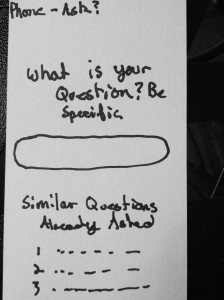
On this screen, users can ask a question. Similar questions are displayed below (stack overflow style) to cut down on redundant questions
SECOND IDEA
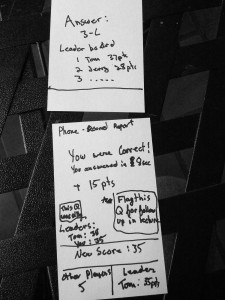
After students submit an answer, they can see if they were correct, and have an opportunity to flag the question as “silly” or “confusing”, for later followup with the professor
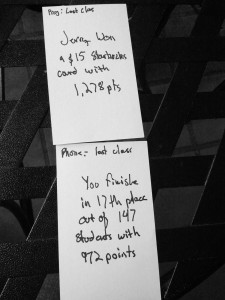
At the end of the semester, users can see how they did overall. The top score is announced, and wins a prize
INSIGHTS
- Users of all ages and majors seemed to like the mobile interface, and immediately understood how to use it. Olivia made the good point that many people don’t have smartphones, and a laptop based interface might also be appreciated
- Competition is fun. People like to compete with each other, and enjoy it. This should be leveraged in future iterations
- Privacy matters, even if situations where you think it shouldn’t. People were worried about other people seeing their score, and either being jealous of a high score, or thinking badly of them for a low score
- Age matters, even on a small scale (4 years). Freshman were more worried about privacy and their score, while seniors were focused on how it could improve lecture quality. Freshmen tended to become more stressed about the time, while seniors didn’t care
- Age can influence privacy concerns. The freshman I spoke with were significantly more focused on privacy concerns than the seniors.
- Having a small number of big, clearly labelled buttons was very well received. No one had any trouble predicting what the buttons would do, or predicting how a given task would be accomplished. No screens were ambiguous

